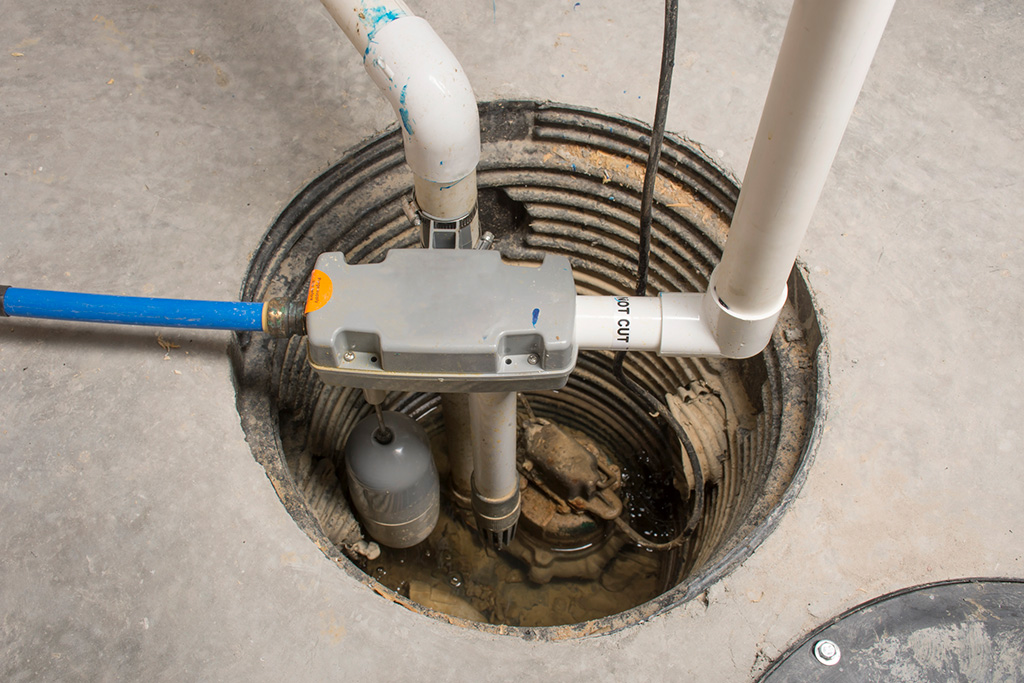You rely on your sump pump to keep your basement dry during heavy rainstorms and prevent flooding. But what’s going on when that trusty pump unexpectedly kicks on during stretches of perfectly dry weather? Hearing that familiar humming sound with nary a cloud in the sky can rightfully raise some concern.
A sump pump running when it’s not raining isn’t necessarily an ominous sign of system failure. There are actually several plausible explanations for why your dehumidifying device decides to spontaneously cycle on, even under arid conditions. From environmental factors and geographical quirks to mechanical issues and system design flaws, a range of potential culprits could be behind that puzzling “dry” operation.
In this guide, we’ll thoroughly explore the various reasons your sump pump might activate seemingly out of nowhere on sunny days. You’ll gain valuable insights to troubleshoot the cause, precious tips for optimal pump performance and longevity, and preventative strategies to safeguard against any serious water intrusion emergencies. If your bone-dry basement sump pit has been anything but quiet lately, read on!

Immediate Answers to the Central Question
Before we dive deeper into the mechanics of sump pumps and troubleshooting techniques, let’s get right to addressing the core reasons why yours might be activating when skies are clear.
Quick Overview of Common Reasons
While a sump pump kicking on with no precipitation may seem baffling at first, there are several fairly common explanations:
- High Humidity/Water Vapor Levels
- Underground Water Sources (streams, aquifers)
- Rain Happening Elsewhere (runoff/drainage issues)
- Failed Sump Pump Components
- Switch/Sensor Problems
- Improperly Sized Systems
The cause could stem from environmental conditions like humidity condensation, geographical quirks like your home’s proximity to water sources, or any number of technical malfunctions within the sump system itself. Sometimes it’s an isolated incident, while other times it indicates an ongoing issue to address.
Environmental and Geographical Factors
Contrary to popular belief, sump pumps don’t just activate when rainwater is pouring down from above. Any source of excess moisture accumulating in your home’s sump pit can potentially trigger the pump – even when outdoor conditions seem perfectly dry.
For starters, high humidity levels allow more airborne water vapor to condense around cool basement areas. This explains why sump pumps sometimes cycle during muggy summer stretches with no actual rainfall. The air’s moisture content alone is enough to overwhelm the pit.
Additionally, if your home is located near underground sources of water like streams, aquifers, or natural springs, the pump may activate due to this runoff seeping into basement areas regardless of precipitation. Seasonal groundwater fluctuations can suddenly inundate sump pits.
On a similar note, heavy rain occurring at another location can send stormwater runoff flowing towards homes further away. Backed up municipal drainage systems may redirect water on its way elsewhere directly into your sump pit on sunny days.
Even the ground’s soil composition and drainage properties in your specific geographical area can contribute to excess moisture finding its way inside during dry spells. Clay-heavy earth acts like a moisture blocker, channeling water inward.
So while localized dry air may be the weather outside your home, it doesn’t necessarily represent the moisture levels your sump pump is contending with from unseen sources. Geography and environmental conditions create plenty of exceptions to rain showers being the sole culprit.
Technical and Mechanical Issues
Of course, sump pump operation during dry periods could also indicate a technical or mechanical issue of some sort within the system itself – an occurrence just as likely as environmental factors.
Faulty float switches that detect pit water levels are among the most common sump pump problems, spurring unnecessary cycling. If the switch gets stuck in the “on” position by debris or a malfunction, it continuously signals the pump to activate – rain or shine.
Conversely, a defective pump check valve can allow water to drain back down into the pit after each cycle instead of staying discharged, creating a never-ending on/off loop. Or the pump’s inlet screen could be clogged, whiling away in a vain attempt to clear a non-existent flood.
Oversensitive weight sensors, electrical issues like improper grounding, failed pump motor bearings, and even an improperly sized system designed with inadequate pit volume for your home’s needs can all prompt dry weather operation as well.
So while the root cause could be innocuous environmental factors, unexpected sump pump activation during drought may also stem from a technical problem requiring repair or part replacement. Knowing which scenario you’re dealing with is key to resolving the issue.
In-Depth Exploration of Sump Pumps
Before we can fully grasp the reasons behind your sump pump’s baffling antics of spontaneously activating during bone-dry weather, we need to first break down exactly what these systems are and how they operate.
What Are Sump Pumps?
Put simply, sump pumps are home flooding superheroes – specialized devices stationed in the lowest depths of your basement, adamantly monitoring moisture levels and kicking into action to pump out any accumulating water before it can overwhelm and inundate your living spaces.
Their humble base of operations is the sump pit – an unassuming hole jackhammered into the dank basement floor, designed as a collection basin for any excess groundwater, runoff, or plumbing leaks gradually seeping inward from the surrounding environment.
As this sump pit begins taking on water from subterranean sources, the pump uses an electrified impeller mechanism to quite literally suction up and expel that moisture back outside before flooding can occur. A network of discharge pipes transports this expelled water to a storm drain or dry well at a safe distance from your home’s foundation.
To control when this pumping process activates, sump pumps rely on a series of float switches or sensors that essentially act as liquid level monitors. When pit water rises to a preset point, these floats detect the elevation change and trigger the pump motor to energize into action. Once levels recede below another set point after pumping, it automatically deactivates to await the next moisture influx.
While these systems may seem simple in theory, their roles are absolutely vital for preserving home structural integrity and preventing disastrous basement flooding scenarios – particularly in regions prone to excessive groundwater or punishing precipitation patterns.
Components of a Sump Pump System
Of course, sump pumps are more than just a lone impeller whirring away in a dank hole. For the full operational picture, it’s important to understand the key components making up a comprehensive sump pump system:
The Pit Itself
Not all sump pits are created equal – their size, depth, and drainage capabilities are critical factors determining pump efficiency. Too shallow or narrow, and pits can’t handle heavy water flow.
The Pump
The real showstopper – this is the actual pump unit contained within the pit. Pumps come in different motor sizes suited for various home scales and moisture handling needs. Higher horsepower means higher output capacities.
The Check Valve
This critical valve prevents any backflow situations by only allowing one-way discharge travel. If the valve fails, pumped water can drain right back into the pit in an endless loop.
The Switch
Whether it’s a bulbous float switch or sensor mechanism, this is what detects rising and falling pit water levels to automatically control when pumping activates or shuts off.
The Pipes
A series of discharge pipes carry expelled water away from the home’s foundation to a suitable downhill drain point. Pipe diameter must match the pump’s outflow capabilities.
The Drain Inlet
For the system to circulate smoothly, some sort of drain inlet – be it perforated pipes or open trenches – must channel underground moisture into the sump pit basin as intended.
With an understanding of these critical sump pump components and their roles, you’ll be better positioned to properly diagnose any equipment issues or system imbalances potentially prompting your pump’s bizarre “dry” trigger-happiness.
Detailed Look at Sump Pump Issues
With a solid grasp of sump pump basics and system components under our belts, we can now launch a full-scale investigation into the various culprits potentially prompting that puzzling dry weather operation you’ve been experiencing. Some causes are relatively innocuous, while others may require more hands-on troubleshooting.
External Causes and Solutions
As we briefly touched on earlier, excessive sump pump activation during dry periods doesn’t necessarily indicate an equipment failure or malfunction. The root trigger could actually stem from external environmental factors your pump is simply responding to as intended:
High Humidity Levels
While outdoor conditions may appear sunny and precipitation-free, the air’s moisture content indoors can create its own humid microclimate for the pump to contend with. As cooling basement air allows airborne water vapor to condense, your sump pit gradually takes on this accumulation – prompting pump cycling to clear it. Running a dehumidifier helps reduce condensation.
Groundwater Fluctuations
If your home is located in an area with high subterranean water tables or near freshwater sources like streams, even temporary groundwater fluctuations can suddenly inundate basement areas and sump pits regardless of outdoor rainfall frequency. Seasonal effects are common culprits here.
Leaky Plumbing
That incessant pump hum could simply be due to an interior plumbing leak gradually feeding moisture into the sump pit over time. Inspect nearby utility pipes, water heaters, and appliance connections for any drips or sweating.
Surface Runoff
Sometimes the rain doesn’t have to fall directly on your home to impact its sump pump. Excessive runoff from storms in surrounding areas can flow towards your property from oversaturated drainage systems or inclines, finding its way into your foundation.
While annoyances, these types of external moisture sources don’t necessarily indicate a critical pump system failure – your sump is simply doing its job of removing accumulating water as designed. Addressing the greater root cause through solutions like basement waterproofing may provide longer-term remedies.
Troubleshooting Specific Problems
Of course, repeated dry periods sump pump activations could also signify an equipment issue of some sort preventing proper operation and monitoring. When external factors seem unlikely culprits, it’s time to break out the toolbox and get hands-on with some focused troubleshooting:
Inspect the Pit
First, examine the sump pit itself – is there any visible debris, silt buildup, or obstructions preventing the pump’s inlet from properly detecting water levels? Use a vacuum, bucket, or shop vac to clear any extraneous gunk out.
Check the Floats
Perhaps the most common failure point – inspect the pump’s float switches to ensure they’re able to freely move up and down as water levels change. Clear any debris preventing them from activating/deactivating at set points. Consider replacing the floats if they look cracked or severely corroded.
Examine Electrical
Ensure the pump is properly grounded with no electrical wiring issues that could prompt sporadic cycling. Check the circuit breaker controlling the unit for any frequent tripping. You may need to hardwire a dedicated line if compounding electrical gremlins persist.
Leak Test
For stubborn issues with no obvious cause, disconnect the discharge pipe and run the pump manually to check for any leaks around the gaskets or impeller assembly. Replace faulty components as needed or upgrade to a new pump unit if integrity is severely compromised.
Review System Sizing
Finally, make sure the overall pump and pit configuration is properly sized to handle your home’s moisture intrusion levels without getting overwhelmed. An undersized system cycling constantly may require a larger capacity upgrade.
With some hands-on inspection and troubleshooting following these key steps, you’ll get a much better understanding of what’s truly behind your sump pump’s restless operation – be it innocuous environmental factors or a crucial internal repair need. Don’t ignore those dry weather activations until the root issue is solved!
Importance of Sump Pump Sizing and Efficiency
When it comes to sump pumps seamlessly doing their duties without any erratic dry weather hiccups, sizing and efficiency are absolutely critical. An undersized or improperly configured system spells disaster in the form of overworked equipment, heightened burnout risks, and potential flooding disasters if the unit can’t keep up with moisture levels.
Just like selecting an appropriately-sized dehumidifier or HVAC system for your home’s square footage, sump pumps require matching their flow rate capabilities to your basement’s expected water intrusion levels and pit capacity. Undershooting leaves you vulnerable while oversizing wastes energy.
The pumping capacity, rated in gallons per hour (GPH), should accommodate your home’s needs with a slight buffer. For most average-sized homes with modest moisture issues, pumps in the 2,000-3,500 GPH range often suffice. But properties prone to heavy groundwater or located in absolutely saturated regions need higher 4,000-6,000 GPH muscle.
Pit dimensions are also a crucial factor in determining that capacity sweet spot. Too shallow or narrow leaves minimal room for the pump to handle heavy inflows during peak periods. Generally, pits measuring at least 24 inches across and 18-24 inches deep provide ample space.
Efficient systems also hinge on properly matched discharge pipe sizing. Using undersized piping too narrow for a pump’s outflow creates excess backpressure that causes strain and short cycling issues. Vent these discharge lines outside at a downhill grade, with any turns or joints as minimized as possible.
Finally, considering a pump’s head pressure rating (measured in feet) helps ensure your pit-to-discharge distance doesn’t overshoot the unit’s design limits. The further water must be forced upwards or outwards to its drainage point, the more strain is exerted on the impeller and motor.
With a properly sized sump pump operating within its intended efficiency envelope, you optimize the system for peak dewatering performance with minimal disruptions or premature breakdowns. Overworked or undersized pumps beget a myriad of operational woes – including that undesirable dry weather cycling we’re aiming to avoid.
Maintenance and Regular Check-Ups
Even with a sump pump system properly sized for your home’s dewatering needs, these hardworking units require ongoing maintenance and regular check-ups to ensure they’re primed for action whenever moisture rears its unwanted head. Neglecting some basic upkeep is just asking for operational issues and unreliable performance down the line.
Routine Maintenance Practices
While sump pumps are relatively simple machines, treating them to some routine TLC ensures they’ll stick around for the long haul rather than sputtering out in a premature, leaky death spiral when you need them most. A few key maintenance practices:
Testing and Cycling
At least a few times annually, it’s wise to run the pump through a manual cycle to verify it’s activating and discharging water as intended. Pour a bucket of water into the pit to raise levels and see if the float triggers operation as it should.
Cleaning and Debris Removal
Preventing debris buildup around the inlet screen and throughout the sump pit interior is crucial for unobstructed operation. Use a wet/dry vacuum to routinely clear out any accumulated gunk, rocks, sticks, or silt twice yearly.
Checking Pipes and Discharge
Inspect all discharge piping for any cracks, leaks, or separation from the pump itself that could prevent proper drainage flow. While you’re at it, follow exterior pipes to ensure they’re venting away from the home’s foundation.
Lubricating and Part Replacement
Any pump components like impellers or bearings will inevitably suffer wear over years of frequent use. Relubricate these moving parts annually and replace anything excessively deteriorated to prevent sudden failures.
Monitoring Power and Grounding
Problems with electrical feeds, grounding, power surges, or circuit breakers can be culprits behind sump pumps operating erratically. Inspect wiring at least yearly and add surge protectors or dedicated circuit lines if needed.
Along with routine DIY practices like these, sump pumps should also receive a more comprehensive professional inspection at least every 2-3 years to catch any developing issues beyond basic homeowner maintenance capabilities.
Professional Help vs DIY Repairs
While relatively straightforward in design, sump pump repairs can quickly escalate beyond the abilities of most DIY homeowners once you start dealing with impeller replacements, capacitor swaps, complicated disassembly, or full system upgrades.
For major repairs, persistent problems, or outright system replacements, it’s wise to enlist professional plumbing or sump pump installation experts with the equipment and expertise to properly diagnose underlying faults and implement lasting remedies. Their routine maintenance and inspection services also help catch brewing issues before emergency situations arise.
From verifying proper operation and cycling to removing built-up debris and ensuring critical components are in working order, sump pump maintenance isn’t optional – it’s mandatory for ensuring this essential home device kicks into high gear when you need it most rather than sputtering out during a crisis. Stay on top of upkeep to avoid getting inundated.
Preventative Measures and Backup Systems
With that sump pump maintenance checklist committed to memory and a repair kit perpetually at the ready, it’s time to construct the final fortress walls in your basement’s defense network against liquid infiltration. Because even the most diligently maintained dewatering system is still vulnerable to power outages, equipment failures, or drain line insurrections by invading tree roots.
Having robust preventative strategies and an elite backup squadron of pumps on standby ensures you avoid catastrophic flooding scenarios should your primary sump surrender unexpectedly. It’s all about layering protections – because the only thing worse than a damp basement is an all-out aquatic onslaught reducing your downstairs man cave into a mockery of its former self.
Recommendations for Backup Systems
When facing the sump pump’s dark mirror universe of power failures and clogged drainage lines, a single point of failure simply won’t cut it. Redundancy and backup plans are critical for avoiding liquid Armageddon. Some top reinforcement recommendations:
Battery Backup Pumps
Why trust your basement’s destiny to the fickle power grid overlords when you can install a battery-operated rebel alliance? With onboard power reserves, these auxiliary pumps jump into the fray whenever the primary unit signals distress or gets knocked offline by an outage insurgency.
Water-Powered Auxiliaries
Alternatively, you could opt for a water-powered backup pump that utilizes your home’s municipal water supply pressure rather than batteries. When clogs constrain the primary drainage pipes, this aqua-fury puts those incoming gallons to good use pumping back out.
Whole-Home Generators
For the full home fortification experience, compact gas or propane generators provide whole-property power assurance – keeping sump pumps and other preventative systems charged up through any grid disruption.
Liquid Level Sentries
At the very least, high water alarms act as an early warning system against rising tides. With audible notifications or smart alerts, you’ll know to rush in with sandbag defenses before the levees break completely.
Combine any of these preventative backup systems with your regular sump pump maintenance, and you’ll rest easy knowing you have multiple defensive lines to handle any soggy scenarios nature can muster.
Preventative Strategies for Drying Times
Beyond backup plans for sump malfunctions, there are also proactive moisture control tactics to implement around your home’s perimeter – denying that liquid adversary any footholds to advance:
Leak Whack-A-Mole
Plumbing leaks from pipe cracks, appliances, and water heater sweating act as stealth Pool Man operatives – slowly replenishing sump pits behind your back. Plug those drips at the source!
Downspout Reconnaissance
Ensuring all gutter drainage pipes expel their rainwater payloads well away from your home’s foundation eliminates any runoff rendezvous spots pooling around basement entrances.
Full Perimeter Lockdown
For the real slobberknockers suffering endless groundwater skirmishes, interior drain tiles and professional waterproofing services create the ultimate underground bunker against infiltration.
Stay ever-vigilant with preventative moisture control measures combined with reliable backup sump pump forces – and those aquatic adversaries won’t have a Drop Shot’s chance of breaching your dry sanctuary!
Silence Those Sump Pump Shenanigans with Bassett Services
You’re now armed with the knowledge to diagnose those baffling dry weather sump pump activations – from environmental factors like humidity and runoff to technical bugaboos like stuck switches and clogged discharge lines. You’ve got the maintenance protocols to keep your dewatering sentinel fit for duty and understand preventative measures to control moisture supply lines.
But even for sump pump warriors wielding augers and shop vacs, persistently puzzling issues eventually demand backup from Bassett Services’ waterproofing forces. Whether you face system failures, repetitive dry cycling hauntings, or the need for comprehensive diagnostics, our plumbing team is ready to deploy.
We arrive equipped with powerful hydro-jetters, camera recon drones, and heavy-duty auguring artillery. We’ll annihilate any clog or moisture insurgency, implement preventative drainage solutions, and ensure your basement is finally dried out and stabilized for good.
Send those rogue pump activations to a watery grave for good. Call Bassett Services at (317) 360-0054 and allow our technicians to command that dewatering system to stand down. Dry days are ahead!





